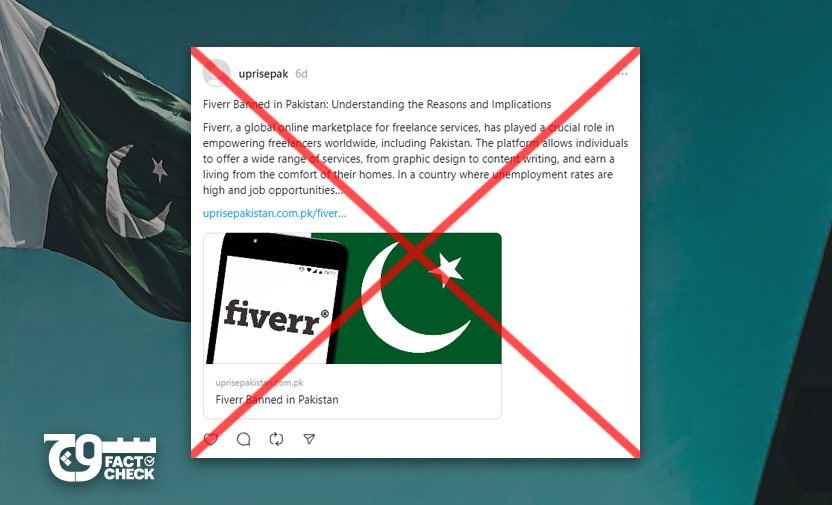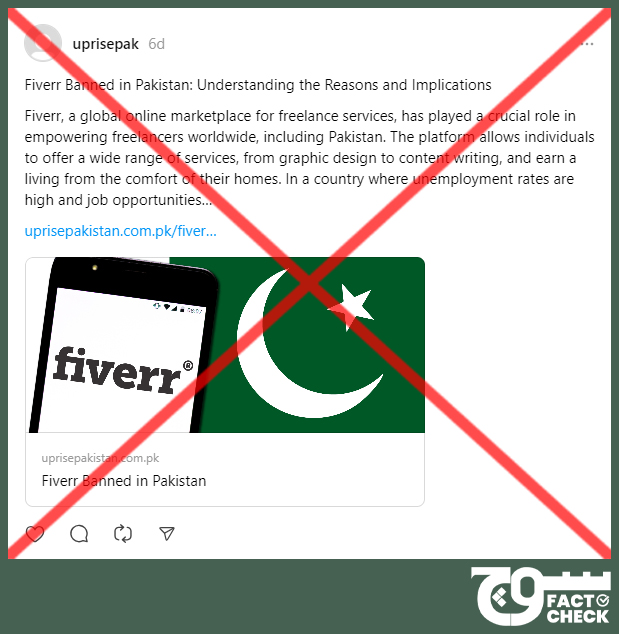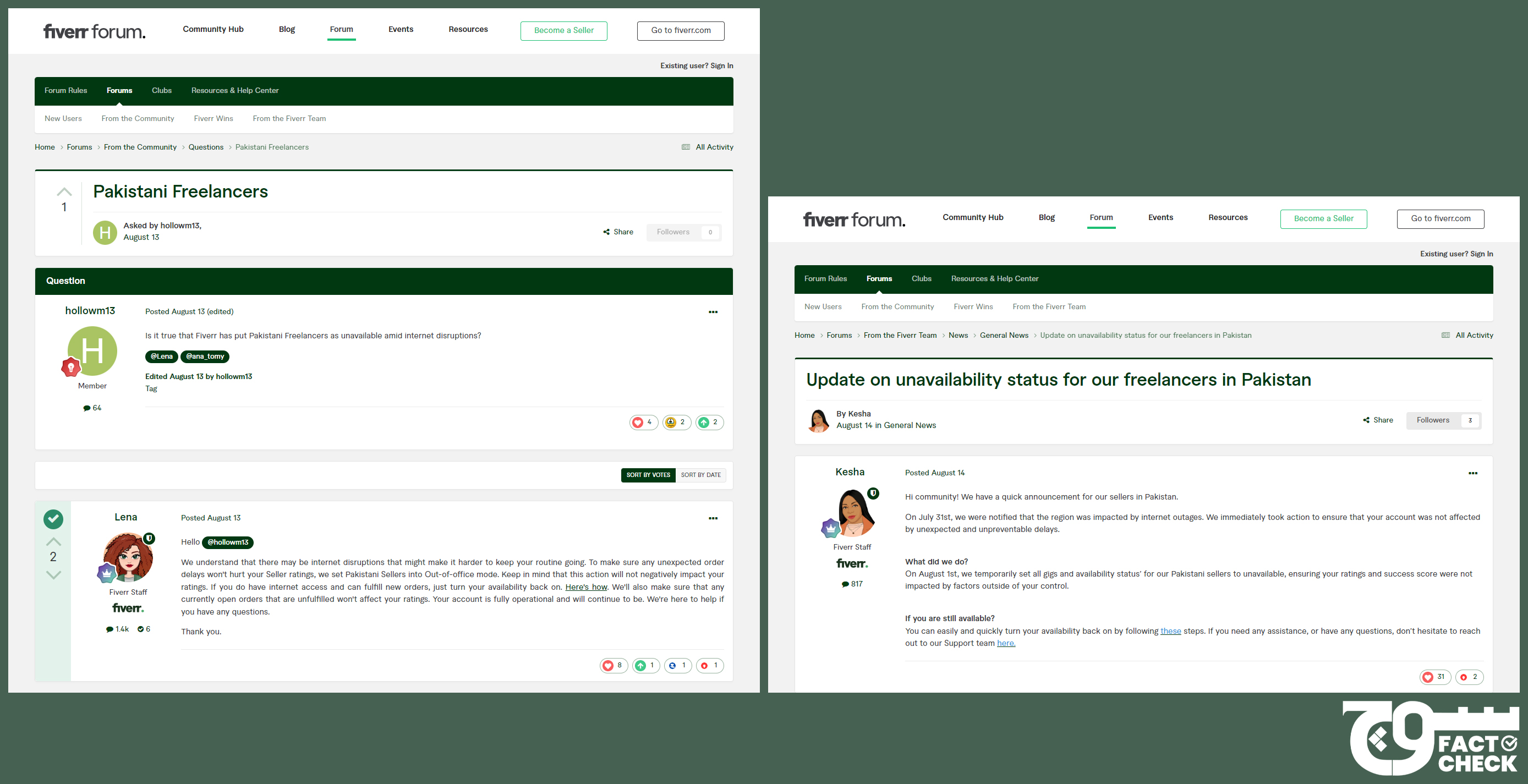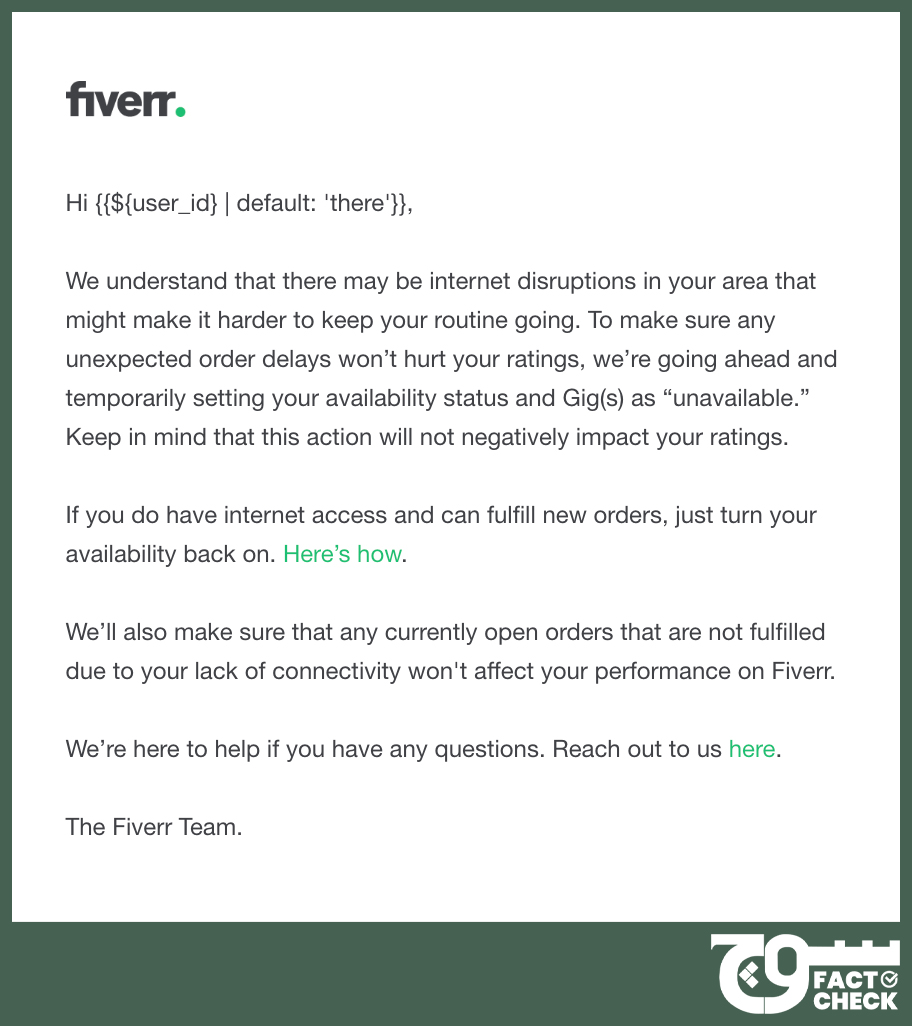
Claim: Fiverr has been banned in Pakistan.
Fact: Fiverr has not been banned, nor has it suspended its services in Pakistan. The platform briefly flagged some Pakistani freelancers’ accounts in August 2024, owing to the ongoing Internet slowdown, but a company spokesperson has confirmed that most of them “have now returned to normal”.
On 15 August 2024, Threads account @uprisepak claimed (archived) that the Israeli freelance services marketplace Fiverr has been “banned in Pakistan”. The post included the link (archive) to an article titled “Fiverr Banned in Pakistan: Understanding the Reasons and Implications.”

Multiple other iterations of the claim emerged on social media platforms and the same were published by news outlets as well. Some asserted that Fiverr was disabled in Pakistan or that it stopped its services in the country. Others alleged that the company had suspended the accounts of Pakistani freelancers or that Pakistani users were banned or blocked from the platform altogether.
Internet slowdown in Pakistan
A major internet disruption has been observed (archive) in Pakistan since mid-July 2024, with people reporting “either complete shutdowns or significantly slower speeds”. While X, the platform formerly known as Twitter, has been banned (archive) since 17 February 2024, in the aftermath of the general elections that were marred by allegations of rigging (archive), other applications also experienced a significant slowdown.
NetBlocks, a watchdog that monitors cybersecurity and internet governance, flagged disruptions twice: on 17 July and 31 July 2024 (archived here and here, respectively). An AFP report (archive) stated that “Internet networks have been up to 40 percent slower than normal since July” after the government started testing what activists and business leaders said were “new controls to crush dissent”.
On 20 July, a report (archive) revealed that the Pakistan Telecommunication Authority (PTA) sought bids for tenders to deploy a national firewall. It quoted a cybersecurity analyst as saying the system could “slow down service access and restrict functionality [of applications], such as preventing the sharing of content or media like voice messages and photos on applications like WhatsApp”.
PTA sources informed (archive) a media outlet that the next-generation firewall “will possess deep packet inspection capabilities, allowing for data inspection up to layer seven” and “enable real-time data monitoring, URL filtering, application control, and malware protection”.
Talks about a national firewall have been going on since January 2024, when Anwaar-ul-Haq Kakar, then the caretaker prime minister, hinted (archive) at deploying the said cybersecurity system “to subdue the negative tendencies of social media”.
Another report (archive) quoted a source with knowledge of the firewall being implemented as saying that the system was “acquired from China and installed through the Ministry of Defense” that would “give Pakistani authorities information about an individual user’s online activities and where they are operating from, allowing for targeted monitoring”.
On 25 July, a report (archive) citing people familiar with the developments stated that the Government of Pakistan was running and had completed a “trial run of [a] firewall” that allegedly “resulted in the slowing down of social media”.
A day later, Minister of State for Information Technology and Communications Shaza Fatima Khawaja finally confirmed (archive) that the government was indeed implementing a firewall but termed it “a cybersecurity upgrade” as the country was subject to “daily cyber attacks”.
On 31 July, the PTA announced (archive) that the internet was successfully “restored” across Pakistan as an “interruption” was resolved. Its spokesperson said the disruption was a “fault” in the systems of the Pakistan Telecommunication Company Ltd. (PTCL), which acknowledged the same.
A report (archive) claimed that the Prime Minister Shehbaz Sharif-led administration has “allocated over PKR 30 billion from the development budget for the acquisition and installation of this filtering system”. Another article (archive) stated that the country set aside over “$70 million for a Digital Infrastructure Development Initiative” in the budget. Ministers have repeatedly denied that the firewall would curtail freedom of speech.
‘Digital terrorism’
On the other hand, the developments appear to be in line with the military’s stance. According to a report (archive) by Dawn, Pakistan Army chief General Syed Asim Munir, in his Independence Day speech on 14 August, said that foreign powers were involved in the “digital terrorism” aimed at forcing a wedge between the Pakistani people and state institutions. A few days prior, on 8 August, he said “anarchy” was being spread through the use of social media, according to the publication (archive).
On 5 August 2024, the director-general of the Pakistan Army’s media wing, the Inter-Services Public Relations (ISPR), Lt Gen Ahmed Sharif Chaudhry, said the country’s law was “not taking its course against [digital terrorism] the way it should” but that the military “will take necessary legal action against it”, Dawn reported (archive).
The top military brass’ use of the terms “digital terrorism” and “digital terrorists” is fairly recent. On 22 July 2024, Lt Gen Chaudhry said “‘digital terrorists’ were using tools such as cell phones, computers, falsehood, and propaganda to impose their will on society just like regular terrorists do”, according to the same outlet (archive).
The term was also used twice in the ISPR’s press releases issued on 30 May 2024 and 5 July 2024 (archived here and here, respectively).
On 21 August, Gen Munir addressed the Pakistani youth, according to the state broadcaster PTV, which quoted (archive) him as saying, “It’s the state’s responsibility to keep the public away from the implications of hysteria and fitna [curse] brought about by social media.”
Conflicting comments, condemnations
However, Khawaja — the state minister for IT — does not appear to be clear about the situation herself either. She has claimed (archive) the government was “upgrading the existing web management system to a firewall”, termed (archive) the reports that the Sharif administration was involved in the Internet disruptions as “completely false”, and blamed (archive) the use of virtual private networks (VPNs) for the sluggish speeds.
The minister — who also boasted (archive) about discussions to bring “5G technology to Pakistan” — was swiftly criticised (archive) by digital rights advocates and IT experts.
Pakistan has completed its second trial of the so-called firewall, a 15 August report (archive) stated, quoting telecommunications sources who said the system was “installed in view of national security concerns” and that all Internet services and social media platforms “would return to normal speed in two to three days”.
An 18 August report (archive) noted that Defence Minister Khawaja Asif acknowledged a “transition” after which “some controls [would be deployed] to prevent threatening and defamatory content against the state and individuals”.
Amid all this, the PTA has maintained (archive) that it did not receive any complaints, saying (archive) it only got to know about the issues through media reports. The authority’s chief, Maj Gen (r) Hafeezur Rehman, has indicated (archive) that the government is working on a “plan” to restrict the use of VPNs and that once “the policy is implemented, only whitelisted VPNs would function in Pakistan and the others will be blocked” — a decision termed (archive) as a “censor and conquer” move.
On 21 August, Dawn reported (archive) that the National Assembly’s Standing Committee grilled Rehman, who responded by saying the Internet slowdown was caused by a “faulty submarine cable” but stressed that the government was not installing any firewalls; the issue, he added, would be resolved by 28 August. The PTA chief also said that he “never stated that VPNs were being restricted” and that “every country, including Afghanistan, has its own system”.
The firewall has generated significant discontent, with petitions being filed in courts in Lahore and Islamabad (archived here and here, respectively); the latter was filed by veteran journalist Hamid Mir (archive). The matter was also taken up by the two standing committees on information technology at the National Assembly and the Senate (archived here and here, respectively).
Multiple associations and bodies have slammed the firewall installation for both curbing freedom of speech and hampering business operations. Among these are the Overseas Investors Chamber of Commerce & Industry (OICCI), Wireless and Internet Service Providers Association of Pakistan (WISPAP), Pakistan Software Houses Association (P@SHA), and the Pakistan Business Council (PBC).
Meanwhile, with WhatsApp down, among other apps, the country also launched (archive) its homemade app called Beep Pakistan, which is presently aimed at government officials but “could eventually be opened up for broader public use too”.
Slowdowns, shutdowns a norm
Pakistan has previously experienced several Internet slowdowns and blockages as the government has employed methods to throttle digital activity and social media platforms multiple times in the past, for example, in February 2024, January 2024, December 2023, and May 2023 (archived here, here, here, and here, respectively), among other instances.
One of the 10 recommendations by Amnesty International issued (archive) in March 2024 urged Pakistan’s government “to uphold the right to freedom of expression by lifting blanket bans on social media platforms”. It said, “A range of vague laws are used to block content, including entire social media platforms, and to justify internet shutdowns.”
The same month, the body became one of the 28 civil society organisations that issued (archive) a joint statement demanding immediate restoration of X and denouncing “digital censorship”.
Freedom House ranks (archive) Pakistan as 26 out of 100 on the Internet Freedom Score 2023, saying the nation was “not free” and that “authorities routinely use internet shutdowns, platform blocking, and arrests and harsh convictions to suppress unwanted online speech”.
Fact or Fiction?
Soch Fact Check looked through Fiverr’s community forum and found two posts from 13 August and 14 August 2024 (archived here and here, respectively), in which the company’s staff members had acknowledged the Internet outages and the action that was being taken.
Staff member Lena wrote in the 13 August message that Fiverr had “set Pakistani Sellers into Out-of-office mode” to ensure any unexpected delays in completing orders did not hurt their ratings amid the “Internet disruptions”.
The 14 August message by staff member Kesha said the company was “notified that the region was impacted by internet outages” on 31 July, prompting Fiverr to “temporarily set all gigs and availability status’ for our Pakistani sellers to unavailable” on 1 August.

In response to our email, a Fiverr spokesperson confirmed to Soch Fact Check that the marketplace has not been banned or disabled in Pakistan nor has it stopped its services in the country. They also refuted the claim that Fiverr has suspended the accounts of Pakistani freelancers.
The spokesperson acknowledged that Fiverr marked the profiles of Pakistani freelancers, who were affected by the Internet outage in the country, as “unavailable” in early August 2024. However, almost all of these profiles are back to normal now.
“In any situation where our freelancers are potentially impacted by a major issue, like this outage in Pakistan, Fiverr wants to ensure that they are protected and their buyers are supported. Our process to do this includes issuing a notification. We did this in early August, first informing freelancers from Pakistan who may have been impacted that we were flagging their account as unavailable (to ensure they were not getting clients lining up when they were unable to support them). This option allows freelancers to pop into their account and mark it as available – instantly – if the issue does not apply to them. Again, most, if not all, freelancers’ accounts have now returned to normal,” they told us.
“Most, if not all, freelancers’ accounts have now returned to normal,” the spokesperson added.
A screenshot of the statement that Fiverr sent out to Pakistani freelancers in early August was attached in Fiverr’s emailed response to Soch Fact Check.

We also noticed that multiple social media posts from August 2024 — such as those available here, here, and here — wrongly quoted text from an old report (archive) published on 11 May 2023 by the business magazine Profit, which stated:
“According to sources, Fiverr, a global online marketplace for freelance services has automatically made gigs unavailable for Pakistani freelancers. This is done to prevent any damage to their response rate and ratings owing to the internet shutdown in Pakistan. A freelance agency owner informed Profit, ‘Fiverr has issued notifications informing its clients that its freelancers from Pakistan may not be able to meet their deadlines due to the suspension of internet services in the country.’”
News visuals posted by Startup Pakistan, a social media page whose pictures often go viral, were also wrongly attached in other posts, further misleading readers. The original post and report from 11 May 2023 are available here (archive) and here (archive), respectively.
The 2023 disruptions in Fiverr also made it to the platform’s community page on here (archive) on 10 May 2023 and here (archive) on 12 May 2023.
Soch Fact Check further observed that some social media posts completely denied any issues with Fiverr, falsely stating that Pakistani users’ accounts were fully active and that users should continue to use the platform while warning to “stay vigilant against this misinformation”. Others said the claim was “being recirculated to create panic” and that certain “individuals are trying to stir unrest”. Some examples can be found here, here, here, here, here, here, here, here, and here.
Fake ‘fact checks’
Media outlets, including WE News (archive), SAMAA TV (archive), Pakistan Today (archive), and Aaj TV Official (archive), published “fact checks”, making the same assertions that the reports were spread by “accounts affiliated with a political party” in a “deliberate attempt to stir unrest”, that there were “no recent notifications or updates” available “on Fiverr’s official community groups”, and that a “video demonstration” had been provided to refute the claims on social media.
It is false that there were “no recent notifications or updates” available on Fiverr’s community groups, as we found the two aforementioned posts here and here. In their emailed response, the platform’s spokesperson has denied ever giving a “video demonstration” to any of the outlets.
WE News even falsely attributed a comment to a Fiverr spokesperson, quoting them as saying, “Fiverr’s operations are ongoing without any issues affecting Pakistani freelancers. We have conducted thorough checks and can confirm that the platform is fully operational for all users, including those from Pakistan.”
The company told Soch Fact Check that while it was true that the accounts of those affected by Internet outage in Pakistan “are using Fiverr as normal” and their profiles back to available, “that statement was not provided by me or any other spokesperson at Fiverr”.
We also came across an op-ed by Dr Aasim Sajjad Akhtar — an associate professor at Quaid-e-Azam University’s (QAU) the National Institute of Pakistan Studies (NIPS) — published in Dawn that stated (archive), “A number of foreign companies — most prominently Fiverr — have suggested they will soon shift their operations away from Pakistan because their daily losses run into the millions.”
However, when asked about the aforementioned statement, the Fiverr spokesperson said, “No this is not true. Fiverr values its freelancers and buyers in Pakistan.”
Virality
Soch Fact Check found that SAMAA TV’s English website reported (archive) the false claim but deleted it later and instead posted an erroneous fact check. Geo News stated (archive) that Pakistani freelancers’ accounts had been “suspended”.
BOL News also ran multiple video reports — here, here, here — with the false claim in the cover images. TNN English wrongly claimed (archive) that Pakistani freelancers’ accounts were “blocked”.
Other posts can be found here, here, here, and here on YouTube. The claim was also shared here and here on X and here on TikTok.
The claim was also shared here and here.
Conclusion: Fiverr briefly flagged some Pakistani freelancers’ accounts as “unavailable” in August 2024, owing to the ongoing Internet slowdown, but a spokesperson confirmed that most of them “have now returned to normal”. The platform has not been banned in Pakistan.
Background image in cover photo: Ali Khokhar
To appeal against our fact-check, please send an email to appeals@sochfactcheck.com
